Zionism During the Holocaust describes the background to the Kasztner Trial & Perdition which was the pretext for the Deselection of Jamie Driscoll as Mayor for North Tyne

Roger Waters Rebuts the Zionist Lies About the Wall Being Fascist
The false accusations of anti-Semitism have not gone away now Corbyn is no longer leader. Keir Starmer, in what is clearly a libelous letter, has defamed Roger Waters and accused him of ‘spreading deeply troubling anti-Semitism’. Starmer has also shown himself out to be the repressive little shit that he is by calling for the cancellation of Roger Water’s gigs.
As Skwawkbox puts it ‘Roger Waters has money. Let’s hope he sues the arse out of Starmer’s trousers.’ There is nothing too despicable for Starmer to put his name to it. But when it came to the murder last week of 2 year old Muhammed Tamimi by Israeli soldiers who shot him in the head, Starmer said nothing. No matter what Israel does it is untouchable. The Labour Party today is led by a despicable racist and liar.
As I wrote in any essay over 30 years ago, ‘anti-Semitism’ is the false antiracism of the Right and so it is proving. Indeed to be accused of ‘anti-Semitism’ today is to be accused of anti-racism!
Why is the Establishment and figures like Starmer so concerned about ‘anti-Semitism’? It is because Jews aren’t the victims of racism and the economic and class discrimination that come with it. If Jews were the targets of a real, widespread anti-Semitism that is sponsored by the state then Starmer and his Tory/ Labour protégé, Christian Wakeford, who have both called for the cancellation of Roger Water’s gigs, would not want to know.
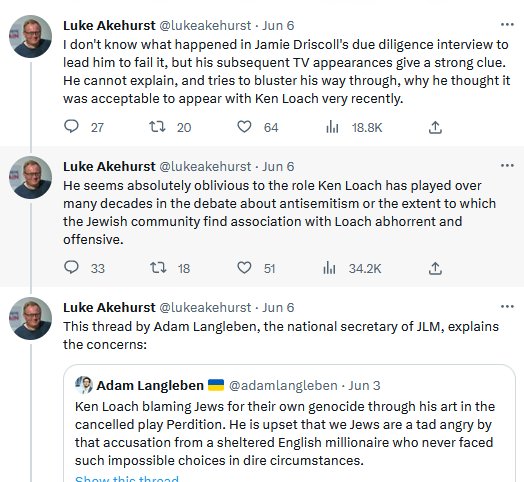
Last week Jamie Driscoll, the Mayor for North of Tyne, was deselected by a Labour NEC panel. No reason was given.
Called the ‘last Corbynista in power’ Driscoll told the Guardian that he was not given any reason for being blocked from standing, but suspected it was “because I would have won” and because “my political positions have fallen out of favour with the current party leadership”.

Driscoll’s ‘crime’ was believing serial liar Starmer when he made 10 pledges in order to become leader, in particular Pledge No. 5 which said
Public services should be in public hands, not making profits for shareholders. Support common ownership of rail, mail, energy and water; end outsourcing in our NHS, local government and justice system
Starmer, whose campaign was secretly funded by rich Zionists, believed not a word of it but was happy to make pledges he had no intention of keeping.
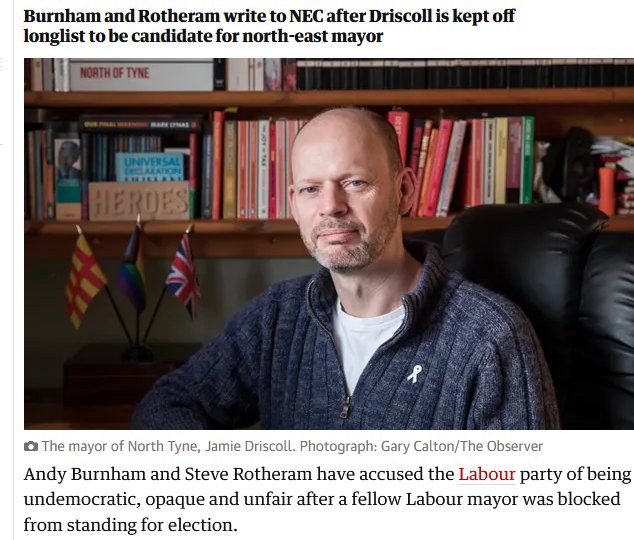
Driscoll himself cited his support for a wealth tax and common ownership of utilities – a Labour party policy under Jeremy Corbyn, which has been ditched by Starmer. Driscoll also supports proportional representation, which Starmer doesn’t.
In a friendly sit-down interview with Mr Driscoll during the 2020 Labour leadership contest Starmer told Driscoll: “There is more that unites us than divides us“. The Independent reported that:
anonymous sources have linked it to Mr Driscoll once appearing on a panel with film director Ken Loach, who has himself been kicked out of the Labour party for supporting a proscribed organisation.

Luke Akehurst defend Israeli snipers opening fire on unarmed demonstrators in Gaza in 2018, killing 234 including 49 children
This was confirmed by far-right Labour NEC member Luke Akehurst, who is the Director of We Believe in Israel. In 2019 Akehurst defended Israel using snipers to murder and maim thousands of unarmed Gazans, including over 50 children, who demanded the right of return to their original homes in Palestine.
On his Twitter thread Akehurst made it very clear why Loach, Britain’s most distinguished film producer, a veteran socialist who has produced award winning films such as Kes, The Wind that Shakes the Barley and I Daniel Blake, was nonetheless anti-Semitic. Akehurst who is non-Jewish felt confident to speak about what the ‘Jewish community’ felt:
He seems absolutely oblivious to the role Ken Loach has played over many decades in the debate about antisemitism or the extent to which the Jewish community find association with Loach abhorrent and offensive.
What Akehurst was referring to was the Zionist leadership of British Jews. What had particularly outraged them and Akehurst was Loach’s role in the production of Jim Allen’s play Perdition.
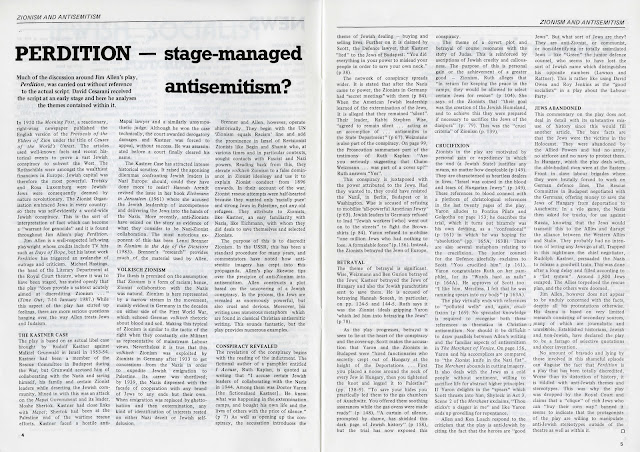
Akehurst cited in his support an article by David Cesarani, a Zionist historian, ‘Perdition – Stage-managed anti-Semitism?’,. I am going to analyse what Cesarani says in this article and explain why it is flawed.
Cesarani was an ideologically driven historian and his best book, Final Solution, came out after he died at the age of 58. It is true that Cesarani wrongly branded Perdition as anti-Semitic. However he also regretted his attempt to censor it. This kind of nuance is too much to comprehend for the likes of Akehurst who is a propagandist.
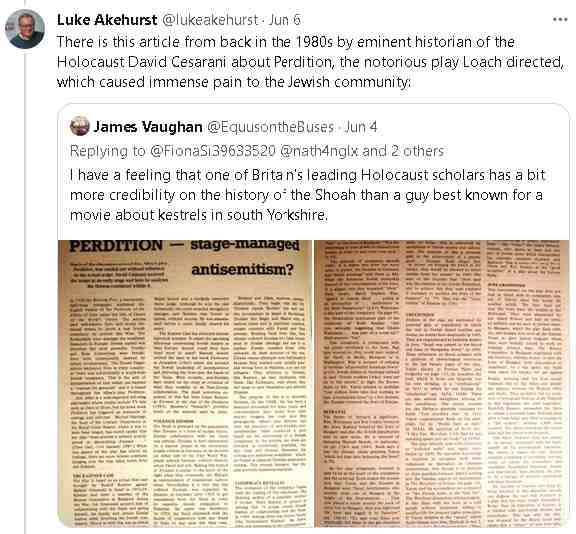
Cesarani wrote in the Jewish Chronicle (3.7.87.) after the Perdition controversy:
Was it worth all the fuss?… Had the play gone on it would have been seen by around 2,000 people…. We need to master the art of exposing and debunking, instead of instantly branding antagonists as anti-Semites…
Note those words: ‘instantly branding antagonists as anti-Semites’. That’s what happened and it rebounded because most people weren’t convinced by the ritual accusations of ‘anti-Semitism’ and the more they looked the more they asked their own questions.
Professor Robert Wistrich of Tel Aviv University, a right-wing Zionist historian, albeit an honest one (a rare breed) went even further and condemned ‘as unwise’ the attacks on the play as anti-Semitic. Wistrich held that ‘the entire Jewish leadership of that generation – including the Zionists – failed the test of the times.’
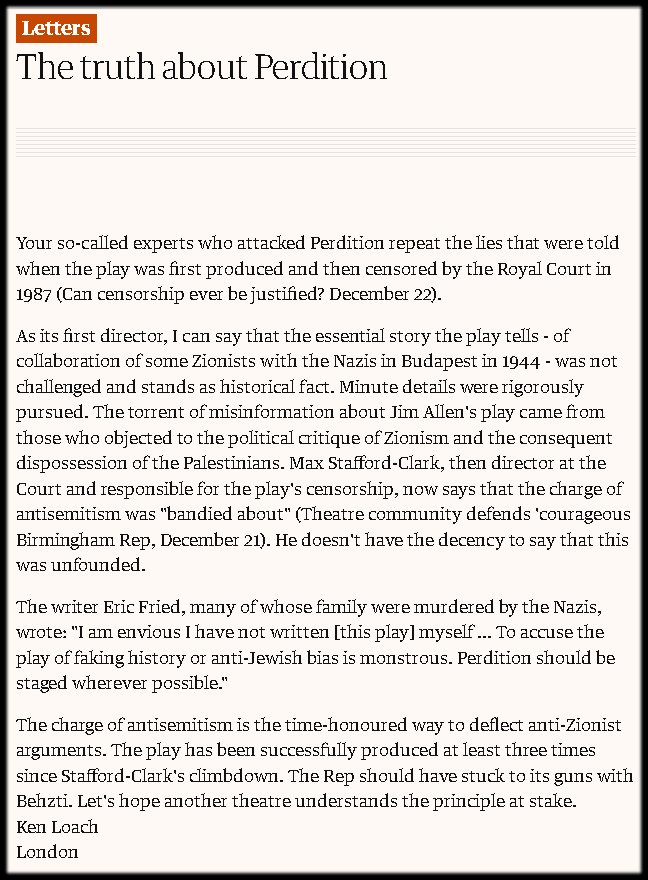
Wistrich conceded that ‘the major priority of the Zionist movement at the time was indeed building Palestine’ and that the Holocaust took second place. He accepted that ‘a reasonable case’ could be made that Zionists did not fight anti-Semitism before 1939 ‘with the appropriate vigour’ and further
‘that some Zionists wanted to develop a ‘special relationship’ with the Nazis…. To deny these points… is not only stupid but unnecessary.’ [Wistrich, Between Redemption & Perdition: Modern Antisemitism and Jewish Identity, p. 244. Routledge 1990]
In Final solution (p.96)Cesarani confirmed what Ken Livingstone had said writing that:
‘The efforts of the Gestapo are oriented to promoting Zionism as much as possible and lending support to its efforts to promote emigration.’
Was Cesarani correct that Perdition was ‘Stage-managed anti-Semitism?
Cesarani’s article can be found in Jewish Socialist No. 9 in Spring 1987. It is littered with mistakes and hyperbole. Attempts to find conspiracy theories where there are none. Waffle instead of analysis.
Cesarani described the judge, Benjamin Halevi, as ‘unsympathetic’. Initially that was not true. It was as the evidence mounted up that Halevi became unsympathetic.
Cesarani started off by saying of the Kasztner case in Israel, in which a holocaust survivor Malchiel Greenwald was sued for libel by Kasztner, a prominent member of the governing Israeli Labour Party and former leader of Hungarian Zionism that:
‘Although he won the case technically the court awarded derogatory damages and Kasztner was forced to appeal, without success. He was assassinated before a court finally cleared his name’.
Clearly Cesarani knew nothing about the trial. There were four allegations against Kasztner:
(a) collaboration with the Nazis;
(b) preparing the ground for murder of Hungary’s Jews;
(c) sharing the monies and valuables looted from Hungary’s Jews with Becher
(d) saving a war criminal (Becher) from punishment after the war.
Far from winning the case technically, Halevi found that charges (a) (b) and (d) were proven. Only (c) was not proven. There was no technical victory in the lower court. It was in the Supreme Court that Kasztner won a technical victory in that it was held that in a libel trial you must win on all counts, not just 3 of them.
But even then, the decision to uphold the appeal was by 4-1, not a unanimous verdict and one of the four, Justice Goiten, refused to exonerate Kasztner.
The Supreme Court did not clear Kasztner. They upheld all the facts found by the lower court and unanimously found that charge (d) was proven as Kasztner had lied about having given testimony to the Nuremberg War Crimes Tribunal in favour of Kurt Becher, Himmler’s personal emissary in Hungary and a war criminal.
It later transpired that Kasztner had given testimony in favour of 6 Nazi war criminals including Hermann Krumey and Dieter Wisliceny who were responsible for the deportation of Jews from Slovakia, Greece, Poland and the atrocity at Lidice. Krumey was Eichmann’s second in command in Hungary and in charge of the deportations.
They had the blood of millions on their hands yet Kasztner testified for them. The decision to appeal was so controversial that it caused the fall of the second Israeli government of Moshe Shertok.
Kasztner was assassinated by agents of Israel’s Shin Bet (internal security police) to shut him up.
Cesarani said that Perdition ‘raised the agonizing dilemmas confronting Jewish leaders in Nazi Europe: should, could they have done more to resist’ and cites Hannah Arendt in her book Eichmann in Jerusalem (which the Zionists excoriated as ‘anti-Semitic’) ‘where she accused the Jewish leadership of incompetence.’ What Arendt actually said was:
Wherever Jews lived, there were recognized Jewish leaders, and this leadership, almost without exception, cooperated in one way or another, for one reason or another, with the Nazis… The whole truth was that if the Jewish people had really been unorganized and leaderless, there would have been chaos and plenty of misery but the total number of victims would hardly have been between four and a half and six million people. (p.125)
Cesarani was wrong. Arendt was not alleging incompetence.
Nonetheless Cesarani conceded that German Zionism ‘echoed German volkish rhetoric about blood and soil’ suggesting that this ideological symmetry with Nazi views on the Jews was ‘exploited by Zionists in Germany after 1933 to get concessions from the Nazis in order to expedite Jewish emigration to Palestine.’ This too was untrue.
German Zionism exploited its ideological agreement with the Nazis, that Jews did not belong in Germany and that they were aliens, in order to operate legally under the Nazi regime. They were unconcerned about the emigration of most German Jews and indeed the Ha’avara trade agreement with the Nazis made it harder for most Jews to emigrate.
The Zionists helped destroy the Boycott of Nazi Germany and thus stabilise the Nazi regime. Elie Wiesel, a survivor of Auschwitz wrote:
‘Surely, Jewish Palestine… needed money to finance its development, but this brazen pragmatism went against the political philosophy of a majority of world Jewry. There developed a growing perception that instead of supporting and strengthening the boycott, Palestine was, in fact, sabotaging it.’ (Review: ‘The Land That Broke Its Promise : The Seventh Million: The Israelis and the Holocaust,’ LA Times, 23.5.93.)
Ha’avara broke the Boycott of Nazi Germany. That was why the Nazis agreed to it. It came to the rescue of the Nazi regime when it was weakest. At no time did the Zionist movement join the international campaign against Nazi Germany. As soon as the Nazis came to power the Zionist movement sought to exploit it for the purposes of building a ‘Jewish state.’
The Investor’s Review of 5 August 1933 reported that ‘authoritative opinion is that Hitlerism will come to a sanguinary end before the New Year.’ (‘Hitler hard up’, JC 11.8.33.)
Cesarani wrote in his book Final solution (pp. 81-2) that those who doubted the viability of the regime ‘were not engaged in wishful thinking’ and that it was beset by enemies coupled with a chronic balance of payments deficit. Israeli historian Yf’aat Weiss wrote (The Transfer Agreement and the Boycott Movement, p. 20)
The Zionist movement found itself in a profound conflict between transfer and boycott and, in the broad sense, between the needs of the Yishuv and the sentiments of the Jewish people.
Edwin Black, author of the definitive history of Ha’avara, wrote (p.253)
the Nazi party and the Zionist Organization shared a common stake in the recovery of Germany. If the Hitler economy fell, both sides would be ruined.
Ha’avara may have saved Hitler from being overthrown. (p. xiii) Black speculated that some Zionists ‘wondered if the Transfer Agreement’s aborting the nascent boycott of German goods had precluded any chance of the anti-Nazi crusade succeeding.’
The Zionists’ main argument is that accusations of collaboration with the Nazis is like blaming the Jews for their own murder. We should remember that just 2% of Germany’s half million Jews were Zionists. Zionists were a freak sideshow in the German Jewish community. They were seen as Hitler Juden with their volkish ideology.
Alfred Rosenberg, the Nazi Party’s main theoretician who was hanged at Nuremberg, wrote in 1919 that
‘Zionism must be vigorously supported in order to encourage a significant number of German Jews to leave for Palestine or other destinations.’
Francis Nicosia wrote in [The Third Reich and the Palestine Question, (p. 25)] that Rosenberg ‘intended to use Zionism as a legal justification for depriving German Jews of their civil rights’ and ‘eventually the Jewish presence in Germany.’
Cesarani said that Lenni Brenner, the author of Zionism in the Age of the Dictators and Jim Allen (he doesn’t mention Ken Loach) attributes to the Zionists only half-hearted, rescue attempts because they only wanted ‘racially pure’ and strong Jews in Palestine. But this is not true.
The Zionist movement during the Holocaust was uninterested in any rescue attempts that did not involve Palestine because they believed that if the plight of Europe’s Jews could be solved without recourse to Palestine what was the point of a Jewish state? They preferred their death to their rescue in countries other than Palestine. This is not conjecture. David Ben-Gurion, the Chair of the Jewish Agency and Israel’s first Prime Minister opposed the Kindertransport when Britain agreed to immigration of 10,000 German Jewish children.
On 9 December 1938 Ben Gurion explained that:
If I knew that it would be possible to save all the children in Germany by bringing them over to England, and only half of them by transporting them to Eretz Yisrael, then I would opt for the second alternative. For we must weigh not only the life of these children, but also the history of the People of Israel. (Yoav Gelber, ‘Zionist policy and the Fate of European Jewry,’ Yad Vashem Studies (1939-42) p. 199; Tom Segev, The Seventh Million, p. 28).
It was this, not racial purity that was at the heart of Zionist opposition to rescue schemes that did not involve Palestine.
Cesarani resorts to making accusations of conspiracy. He held it was anti-Semitic to accuse Kasztner of buying his and other Zionist activists lives with the price of silence over the holocaust, but that is precisely what he did when he or his deputy Joel Brand reached an agreement in late April/early May with either Eichmann or Krumey for a train out of Germany for the Zionist elite in exchange for silence over the destination of the deportation trains. That was precisely the charge made after the war by the survivors of the Hungarian holocaust when they testified in the Kasztner trial.
Why was Cesarani’s appalling article printed in the Jewish Socialist? Probably because the most influential member of the Jewish Socialists Group, David Rosenberg, was a friend of Cesarani. This article, with its generalised accusations of anti-Jewish conspiracies, was the kind of stuff that was being printed in the conservative press at the time.
Cesarani took offence at the accusation of betrayal but this was not Ken Loach’s or Jim Allen’s theme, but that of the Hungarian holocaust survivors at Kasztner’s libel trial. Zionism was a quisling movement that betrayed Europe’s Jews. That was why in Poland the Zionist movement grew weaker. In the last free elections in Poland in 1938 the anti-Zionist Bund won 17 out of Warsaw’s 20 Jewish Council seats. The same was true all over Poland. As Isaac Deutscher wrote [Non-Jewish Jew]:
To the Jewish workers anti-Semitism seemed to triumph in Zionism, which recognised the legitimacy and the validity of the old cry ‘Jews get out!’ The Zionists were agreeing to get out.
Cesarani complained that Jim Allen and Ken Loach responded to criticism of the play as anti-Semitic by saying that all the heroes are Jews. ‘But what sort of Jews are they’ writes Cesarani ‘They are anti-Zionist or communist.’ That was precisely what was wrong with Perdition as far as Cesarani was concerned. It told the truth!
Ken Loach, in a letter to the Guardian, before the paper became Freedlandised wrote:
The writer Eric Fried, many of whose family were murdered by the Nazis, wrote: “I am envious I have not written [this play] myself … To accuse the play of faking history or anti-Jewish bias is monstrous. Perdition should be staged wherever possible.”
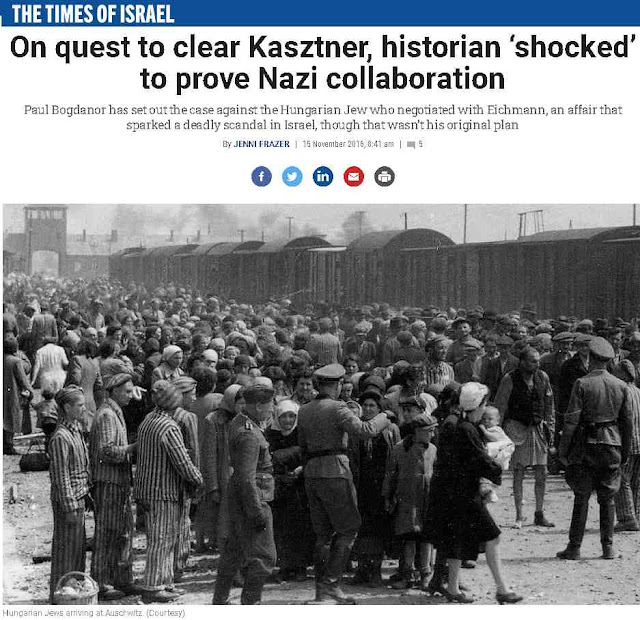
Ironically Paul Bogdanor, a far-right Zionist. set out to rebut the charge that Kasztner was a collaborator. During his research he came to the opposite conclusion. In Kasztner’s Crime. Bogdanor accused Kasztner of being a Gestapo agent! Far from being spotless white as Cesarani and his apologists in the JSG would have you believe, Kasztner was indeed the Nazi collaborator that anti-Zionists had all along maintained.
Bogdanor, a Zionist fanatic, then wove a tale that Kasztner acted as an individual rather than a representative of the Zionist movement. However this is historically untenable. Kasztner represented the Jewish Agency when he went to Nuremberg to give testimony in favour of Nazi war criminals. Indeed they paid his expenses. His accuser in the Palestine Office in Budapest, Moshe Krausz, was dismissed after making a complaint against Kasztner to the Jewish Agency.
The reason I have devoted a blog to resurrecting the 1987 play Perdition is because the controversy is now being resurrected to prove that Ken Loach is anti-Semitic. Zionism relies on recycling lies hoping people will forget the truth. This play was in no way anti-Jewish. It was anti-Zionist and it accurately portrayed the Zionist movement as having collaborated with the Nazis in the extermination of nearly half a million Hungarian Jews.
Below is what I wrote in my recent book, Zionism During the Holocaust, on the Perdition Affair. To understand the background, viz. the holocaust in Hungary, you will have to buy the book though! If you wish to do this please contact me at tonygreenstein104@gmail.com
Tony Greenstein
Perdition
An article that appeared in Ha’aretz less than four weeks after the German surrender asked: ‘Did the Jews also have a hand in the horrible bloodshed committed against our nation?’ [1] It was sentiments such as these that led to the staging of Perdition.
Based on the Kasztner Trial, Perdition was the subject of a ferocious Zionist campaign to ban it. It was due to be shown at the Royal Court Theatre Upstairs in January 1987. After pressure was put on its artistic director Max Stafford-Clarke, it was cancelled because ‘it would cause distress to members of the [Jewish] community.’[2] In other words it would have upset Britain’s powerful Zionist lobby.
Martin Gilbert and David Cesarani supported this campaign, claiming that Perdition was historically inaccurate.[3] But when Salman Rushdie’s Satanic Verses was published, the British Establishment and its tame press cried ‘free speech’. It was irrelevant that Rushdie’s book distressed many Muslims. When Charlie Hebdo mocked the Prophet Muhammad, free speech was again prioritised. The double standards were all too clear.
Jim Allen, who wrote the play, gave some indication of the tactics used when describing how Stephen Roth of the Zionist Federatopm told Stafford-Clarke that he could imperil the Royal Court’s funding by contacting friends in New York and London. One London producer was told that ‘I own nine theatres, my friend owns six. Put the play on and you’re finished.’[4] Ken Loach wrote:
Perdition was stopped by public abuse and private manipulation organized by a political tendency, Zionism, that will not acknowledge its past because of the light it sheds on the present.[5]
According to Cesarani the play ‘purported to reveal a gigantic conspiracy by powerful Jews (to) … mercilessly sacrifice(d) fellow Jews.’ It did no such thing. It revealed the true record of the Zionist movement.[6]
However the ban backfired and Perdition was shown at Conway Hall for six nights as well as at the Edinburgh Festival fringe.[7] It was the subject of letters and articles for weeks in the mass media and set off a far wider debate over Zionism and its role during the Holocaust.
The controversy in The Guardian’s letter columns continued for over two months. For The Times the issue was ‘the right to travesty the past and to slander a nation.’ The idea that there is only one version of history and that any others are a ‘travesty’ or that nations can be ‘slandered’ is indicative of the pernicious standards of Perdition’s critics.[8]
The genie was out of the bottle. Both Cesarani, who described Perdition as a ‘calumny’,[9] and playwright Arnold Wesker, came to regret the Zionist campaign.[10]
Professor Robert Wistrich of Tel Aviv University, an ardent Zionist ideologue condemned ‘as unwise’ the attacks on the play as anti-Semitic. Wistrich held that ‘the entire Jewish leadership of that generation – including the Zionists – failed the test of the times.’ Wistrich conceded that ‘the major priority of the Zionist movement at the time was indeed building Palestine’ and that the Holocaust took second place. He accepted that ‘a reasonable case’ could be made that Zionists did not fight anti-Semitism before 1939 ‘with the appropriate vigour’ and further ‘that some Zionists wanted to develop a ‘special relationship’ with the Nazis…. To deny these points… is not only stupid but unnecessary.’ [11] Professor Wistrich was one of that rare breed, an honest Zionist.
Channel 4 staged a debate between Lenni Brenner, Marion Woolfson and Jim Allen and their opponents led by Churchill biographer Martin Gilbert, Stephen Roth of the Institute of Jewish Affairs and Rabbi Hugo Gryn. Gryn confessed he was ‘deeply depressed by the discussion’.[12] The Zionists had argued for censorship to hide their inability to substantiate their claims that Perdition was historically inaccurate.
I interviewed Jim Allen.[13] At the time his wife was dying with cancer and the Perdition Affair was not something he wanted to devote his time to. Jim Allen, who had written Days of Hope, Big Flame and other TV plays, was one of Britain’s finest socialist playwrights. All through his life he had stood on the side of the working class and the oppressed. The attacks on him as anti-Semitic by establishment toadies like Martin Gilbert were nauseating. Perdition was attacked for what it didn’t say. According to Bernard Levin in The Times, Ben-Gurion ‘smiled on the Holocaust’.

Roger Waters & Cancel Culture
Roger Waters Sets the Record Straight
There has been a vile campaign by the Zionists and its Establishment echoes, like Starmer to cancel Roger Waters. All those who favour free speech when it comes to genuine racists want to cancel an anti-fascist and anti-racist performer on the grounds that he is ‘anti-Semitic’. The real reason the Jewish Chronicle wants him banned is Palestine not fascism.

Water’s parody of a fascist has been part of The Wall performance since 1980. It is now held to be itself a fascist production. His moronic critics would no doubt have called Charlie Chaplin’s The Great Dictator a fascist play too. Waters demolishes the liars in the video above. He also said he had:
“attracted bad faith attacks from those who want to smear and silence me because they disagree with my political views and moral principles”.
“The elements of my performance that have been questioned are quite clearly a statement in opposition to fascism, injustice, and bigotry in all its forms,”

Biden aide’s smear of Roger Waters’s ‘Wall’ performance is slammed at State briefing (Mondoweiss)
Roger Waters and the State Department briefing
The State Department’s press briefing on Monday showed the new mood in Washington: reporters repeatedly raised Israel policy as problematic.
Roger Waters’s advocacy for Palestine shook the briefing room, as a reporter questioned why Deborah Lipstadt, the junk holocaust historian, had echoed the smear that Waters’s performance of “The Wall” was an example of Jew hatred, and failed to see that it is actually a denunciation of fascism akin to Charlie Chaplin’s parody of Hitler as “the great dictator.”
Reporter Sam Husseini, a reporter at the Institute for Public Accuracy, criticized Lipstadt’s comments at the State Department briefing Monday. accusing the Biden administration of deploying the antisemitism charge as “a way of denouncing people who stand up for Palestinian rights.”
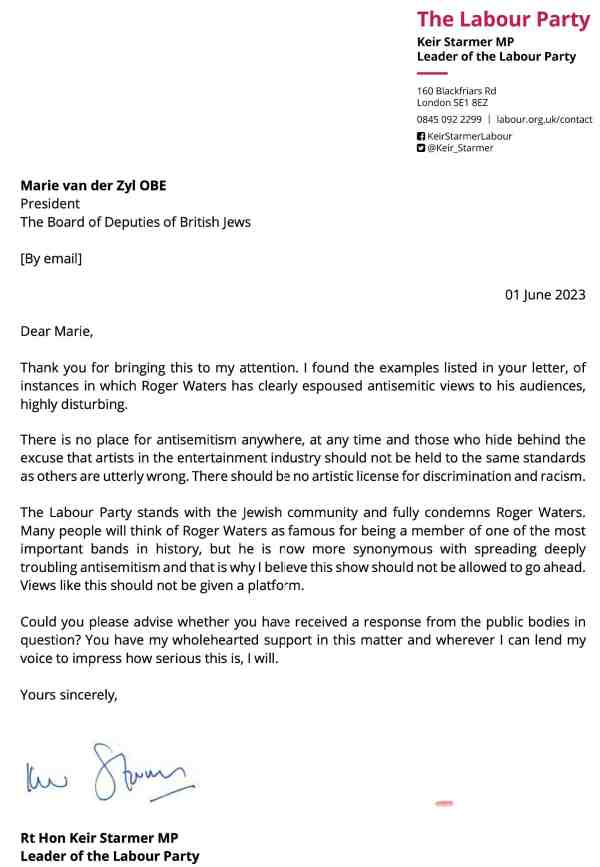
Lipstadt, the State Department’s envoy to “monitor and combat antisemitism,” issued her comment on Waters’s performances on May 24:
“I wholeheartedly concur with [the EU Commission on antisemitism’s] condemnation of Roger Waters and his despicable Holocaust distortion.”
Lipstadt retweeted the European commission’s comment:
“Roger Waters gig in Berlin. Is there anything more antisemitic than using Anne Frank as a prop on a German stage while prancing around in a Nazi uniform attacking Jews?”
This is an incredible distortion of what happened. I don’t know if you’re familiar with The Wall, which is possibly the most classic rock opera in rock and roll history. So– unrelenting denunciation of fascism and racism, one of the songs in it features him as mocking a demagogue like Charlie Chaplin did, and talking to the crowd and saying, “Are there any queers, are there any Jews, are there any blacks in the audience tonight? Get them up against the wall.” And then he gets a machine gun and mows them down.
It’s an obvious attack on fascism, and yet your ambassador is denouncing it and pretending that Roger Waters, presumably because he defends Palestinian rights as well as other people’s rights, is an example of anti-Semitism. Are you going to distance yourself from this, or are you going to back down on this?
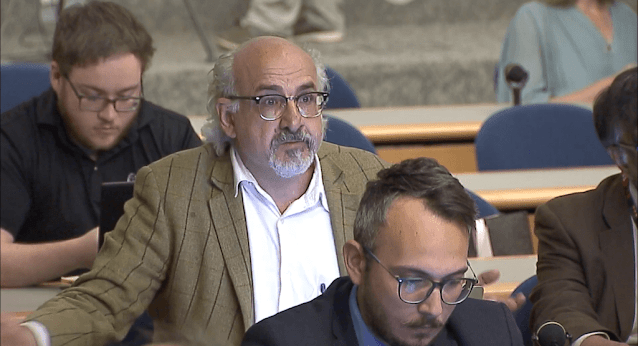
Sam Husseini asks why a Biden envoy is accusing Roger Waters of antisemitism by singing from the rock opera, “The Wall.” June 5, 2023, screenshot.
Vedant Patel of the State Department said he wasn’t familiar with “The Wall” and hadn’t seen Lipstadt’s tweet, so he wouldn’t weigh in. Husseini said that the comment is very much State Department business.
This is her portfolio… She is beyond parody distorting anti-Semitism and criticism of Israel. He [Waters] used Anne Frank’s name as a list of people, of martyrs, who he reveres. It’s an incredible distortion. I think it’s imperative if the State Department isn’t going to wholeheartedly dispense with any pretense about anti-Semitism being an actual problem and only use it as a way of denouncing people who stand up for Palestinian rights, you’ve got to do something.
Patel said that was “absolutely not our approach” to antisemitism. And Husseini said, “Well, prove it.” Matt Lee of the Associated Press also said State needed to answer for Lipstadt’s comment.
It is a situation where we’re talking about a British musician giving a concert in Germany, it doesn’t really have anything to do with the U.S., but the fact of the matter is, is that she did weigh in on it. So it’s a legitimate question.
Waters explained on May 26 that the depiction of an “unhinged fascist demagogue” has been an anti-fascist feature of The Wall since 1980.
The elements of my performance that have been questioned are quite clearly a statement in opposition to fascism, injustice, and bigotry in all its forms. Attempts to portray those elements as something else are disingenuous and politically motivated. The depiction of an unhinged fascist demagogue has been a feature of my shows since Pink Floyd’s “The Wall” in 1980.
I have spent my entire life speaking out against authoritarianism and oppression wherever I see it. When I was a child after the war, the name of Anne Frank was often spoken in our house, she became a permanent reminder of what happens when fascism is left unchecked. My parents fought the Nazis in World War II, with my father paying the ultimate price.
[1] Segev, The Seventh Million, p. 181 citing ‘The Jews among the war criminals’ Ha’aretz, 3.6.45. p .2
[2] The Guardian, Leader, 23.1.87.
[3] The Guardian, 21.3.87. This was untrue.
[4] Perdition, p. 142. Jim Allen, Letter to The Guardian, 18.3.1987.
[5] Ken Loach, letter to The Guardian, 19.3.1987; Perdition p. 142.
[6] Cesarani, Anti-Zionism in Britain, 1922-2002, p. 147.
[7] See The Guardian letter 26.4.99, Barbara Smoker of the South Place Ethical Society which ran Conway Hall https://tinyurl.com/y3pgysye
[8] The Times, 23.1.87. and see letter from Andrew Hornung 28.1.87.
[9] Cesarani, Genocide & Rescue: The Holocaust in Hungary, p. 151, Oxford 1977.
[10] Arnold Wesker, ‘Why I changed my mind,’ JC 24.3.89.
[11] Wistrich, Between Redemption & Perdition: Modern Antisemitism and Jewish Identity, p. 244. Routledge 1990, https://tinyurl.com/y76gdvda
[12] JC 20.3.87, the debates can be found at https://tinyurl.com/5n7nw7t5 and https://tinyurl.com/mvuh79d
[13] ‘Why Perdition should be shown’. Tribune, 27 February 1987. ‘
good morning Mr Greenstein
so very happy to have come across your blog through random links via Novara Media website. Thanks for your deep analysis and commitment to utter & sheer truth. i will keep following your work.
(former Guardian reader) Simone
thank you Simone